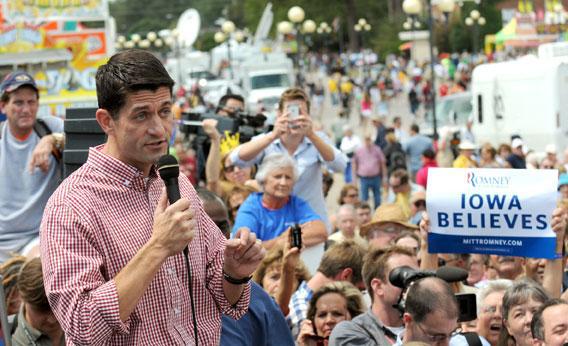Mitt Romney is about to experience the downside of having been an empty vessel for the past year. The Etch A Sketch candidate has now embraced Paul Ryan, and after the momentary excitement wears off, there will be one small piece of good news for Romney and one very large piece of bad news. The good news, for both the American people and for Romney, is that we will finally have the intellectual engagement on issues that the public deserves. This is an even sweeter development for Romney because his tax returns and Bain investments will drop off the table as discussion points, at least for the time being.
But the larger strategic problem for Romney is that because his campaign was so vacuous and lacking in articulable policies, he will now be held accountable for the Ryan perspective on the entire raft of issues on which the presumptive vice-presidential nominee has spoken. And Romney will soon find out that the voters are nowhere near as radical as Paul Ryan.
Ryan is an arch-conservative on social issues and a supply-sider on economic issues. He is not the social moderate and fiscal conservative who might have appealed to the general public. The swing voters in the swing states will soon discover that the new Romney Republican Party has veered to the right—indeed to the fringes—and is now irrelevant to the mainstream.
Just consider Ryan’s positions on these social issues:
He is rabidly against abortion rights, believing life begins the moment a fetus is conceived and that there is no right to abortion even in cases of rape and incest.
He is against same-sex marriage rights of any type.
He toes the NRA line on all Second Amendment gun issues.
On fiscal issues, the Ryan plan is supply-side all over again, a perfect model of the failure of the Bush era. It has no balance in the budget until 2030. Medicare is put on a voucher system that would force seniors to face significant cutbacks.
And his tax policies would endanger all government spending other than defense spending.
From education to research and development, the investments that government provides in critical sectors—investments that are necessary for the economy—are simply not part of Paul Ryan’s worldview.
Ryan is pleasant enough and knowledgeable enough that within Washington he has been tagged as thoughtful. But his policies would be a disaster for the nation and will spell electoral defeat for Romney once they are understood.
The big winner—other than President Obama, whose re-election just got much easier—is Paul Ryan, who will be left standing as the voice of a smaller and even more limited Republican Party heading into 2016.
